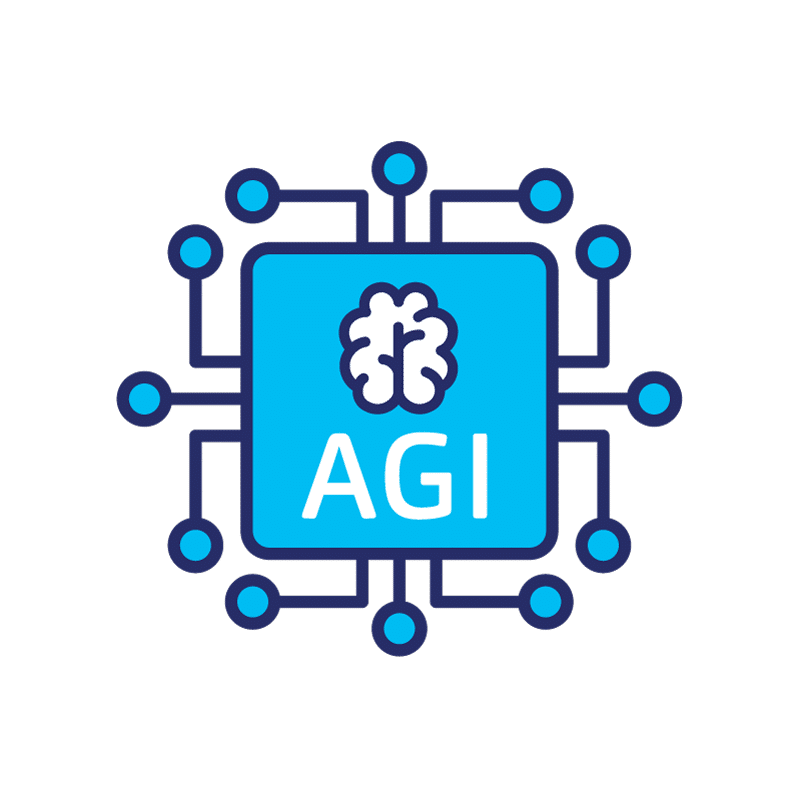What is Artificial General Intelligence? Everything You Need to Know

Artificial General Intelligence, or AGI, is the concept of a machine possessing the ability to understand, learn, and apply knowledge across a broad range of tasks, much like a human being. Unlike narrow AI, which is designed for specific tasks, AGI aims to execute any intellectual task that a human can perform, potentially transforming how we interact with technology. Understanding AGI involves grasping its implications for individuals, as it holds the promise of revolutionizing personal and professional life by offering human-like assistance. As we explore what AGI means and how it stands apart from traditional AI, we'll delve into its potential to shape the future of artificial intelligence and our everyday experiences. Join us as we unpack this fascinating topic in a manner that's easy to understand and relate to, offering insights into the evolving landscape of AI and its impacts.
Understanding Artificial General Intelligence
Simple Explanation of AGI
Artificial General Intelligence, or AGI, refers to a type of AI that possesses the ability to understand, learn, and apply knowledge across a wide range of tasks, just like a human. While narrow AI focuses on specific tasks, such as playing chess or recognizing images, AGI aims to handle any intellectual task a human can perform. Imagine a machine that could learn new skills, adapt to different environments, and make decisions using general reasoning. It could provide human-like assistance in various scenarios, from organizing your schedule to managing complex projects. The pursuit of AGI involves creating systems that are not only task-specific but also adaptable across multiple domains. This level of intelligence remains an aspiration, as scientists and researchers continue to explore its possibilities, hoping to revolutionize how we interact with technology in everyday life.
AGI Definition and Characteristics
Artificial General Intelligence, or AGI, is defined as a machine's ability to perform any intellectual task that a human can do. This includes tasks requiring critical thinking, problem-solving, and emotional understanding. Unlike narrow AI, which excels in specific, predefined tasks, AGI is characterized by its versatility. It can learn from experience, comprehend complex ideas, and adjust to new situations, just like a human. Moreover, AGI aims to possess a level of consciousness, self-awareness, and understanding akin to human cognition. These characteristics make AGI particularly appealing, as it holds the potential to transform industries, enhance personal productivity, and offer unprecedented human-like interaction. However, creating AGI involves overcoming significant technical and ethical challenges, as researchers strive to balance innovation with safety and control. The journey to AGI is not just about achieving technical prowess but also understanding its broader societal implications.
Current State of AI vs AGI
Currently, artificial intelligence is largely characterized by narrow AI systems. These systems are highly specialized, designed to perform specific tasks with great efficiency, such as voice recognition, language translation, or playing strategic games like chess. They operate based on predefined rules and datasets, making them powerful yet limited in scope. In contrast, Artificial General Intelligence (AGI) remains a theoretical concept. AGI aspires to achieve human-like cognitive abilities, learning and adapting across a variety of tasks. While narrow AI has seen rapid advancements, AGI presents a more complex challenge due to its broader objectives. Researchers are focusing on overcoming hurdles related to generalization, adaptability, and ethical considerations. Although the current state of AI has transformed several industries, AGI promises a future where machines could function as versatile companions, potentially altering our interaction with technology in profound ways.
Implications of AGI for Society
It will change the world much less than we all think and it will change jobs much less than we all think.
Potential Benefits and Opportunities
The advent of Artificial General Intelligence (AGI) could unlock a myriad of benefits and opportunities across various domains. One of the most significant advantages is the potential for AGI to drive innovation by solving complex problems that are beyond the capabilities of current AI systems. In healthcare, AGI could accelerate drug discovery, personalize treatments, and improve diagnostic accuracy. In the workplace, it might automate routine tasks, allowing professionals to focus on strategic and creative endeavors. Moreover, AGI could facilitate personalized education, tailoring learning experiences to individual needs and pacing. It could also play a crucial role in addressing global challenges such as climate change, by optimizing resource management and developing sustainable technologies. However, realizing these benefits requires careful consideration of ethical and societal implications, ensuring that AGI systems are designed with fairness, transparency, and accountability in mind. Balancing innovation with responsibility will be key to unlocking the full potential of AGI.
Ethical Concerns and Challenges
The development of Artificial General Intelligence (AGI) raises several ethical concerns and challenges that society must address. A primary concern is ensuring that AGI systems behave ethically and align with human values. This involves programming AGI to make decisions that consider fairness, justice, and the greater good. There's also the challenge of transparency; understanding how AGI arrives at decisions is crucial for trust and accountability. Another significant issue is the potential displacement of jobs as AGI automates tasks traditionally performed by humans, necessitating a reevaluation of economic structures and workforce retraining. Privacy remains a crucial concern, as AGI systems will likely handle vast amounts of personal data. Lastly, there's the risk of misuse, where AGI could be deployed for harmful purposes, necessitating robust regulations and oversight. Addressing these ethical challenges requires collaboration between technologists, policymakers, and ethicists to ensure AGI serves humanity positively and equitably.
Preparing for an AI-Driven Future
Preparing for an AI-driven future, particularly with the emergence of Artificial General Intelligence (AGI), involves proactive planning and adaptation across multiple facets of society. Education systems need to evolve, emphasizing skills that complement AI, such as creativity, critical thinking, and emotional intelligence. Governments and institutions must establish regulatory frameworks that ensure ethical development and deployment of AGI, prioritizing transparency and accountability. Businesses are encouraged to innovate continually, integrating AI technology to enhance productivity while fostering a culture of lifelong learning among employees. On an individual level, staying informed about AI advancements and developing digital literacy skills will be crucial. Public dialogue and collaboration between industries, academia, and policymakers are essential to address societal impacts, ensuring inclusive growth and equitable access to AI benefits. By anticipating changes and strategically planning, society can harness the potential of AGI to create a future that enhances human capabilities and improves quality of life.
AGI vs AI: Key Differences
Narrow AI

General AI
Super AI
Narrow AI vs General AI
Narrow AI and General AI represent two distinct approaches within artificial intelligence. Narrow AI, also known as weak AI, is designed to perform specific tasks with high efficiency. Examples include virtual assistants, recommendation algorithms, and image recognition systems. These systems are optimized for particular functions but lack the ability to perform tasks outside their programmed domain. In contrast, Artificial General Intelligence (AGI), or strong AI, aspires to replicate human cognitive abilities across various tasks. AGI aims to understand, learn, and adapt to new situations, similar to a human's intellectual capabilities. While Narrow AI is prevalent today and powers many technologies we use daily, AGI remains a theoretical goal that researchers are striving to achieve. The development of AGI presents significant technical and ethical challenges yet holds the promise of transforming technology by offering machines that can operate with human-like versatility and understanding.
Examples and Applications
Narrow AI, which is prevalent today, manifests in various applications across different industries. Virtual assistants like Siri, Alexa, and Google Assistant exemplify narrow AI, designed to perform tasks such as setting reminders or answering queries. In healthcare, narrow AI assists in diagnosing diseases through image analysis and predictive modeling. Financial services employ narrow AI for fraud detection and algorithmic trading, optimizing processes with speed and accuracy. Retailers use AI-driven recommendation systems to enhance customer experience by suggesting products based on previous purchases. In contrast, Artificial General Intelligence (AGI) remains a future objective. While no true AGI systems exist yet, the potential applications are vast. AGI could revolutionize fields such as education, offering personalized learning experiences tailored to individual needs. It could also drive innovation in scientific research, tackling complex problems beyond the reach of current AI systems. Achieving AGI would mark a significant leap forward, transforming how we interact with technology.
Future Evolution of Artificial Intelligence
The future evolution of artificial intelligence hinges on progressing from narrow AI systems to the broader capabilities envisioned with Artificial General Intelligence (AGI). As AI technology advances, we anticipate more sophisticated narrow AI applications, enhancing efficiencies in sectors such as healthcare, transportation, and customer service. These systems will increasingly incorporate elements of machine learning and deep learning, allowing them to perform complex tasks with minimal human intervention. The journey towards AGI involves overcoming substantial technical challenges, including developing algorithms that can mimic human-like understanding and learning across various domains. Researchers are also exploring neuromorphic computing, which aims to replicate the brain's architecture to achieve more general intelligence. As AI evolves, addressing ethical considerations and societal impacts will be paramount. Ensuring that AI technologies are developed responsibly will be crucial for fostering trust and maximizing their benefits. Ultimately, the evolution of AI promises to redefine how humans and machines coexist and collaborate.
Step 1
Narrow AI
Specialized AI designed for specific tasks (e.g., language translation, image recognition).
Step 2
General AI
AI with human-like cognitive abilities, capable of understanding and performing any intellectual task.
Step 3
Super AI
Hypothetical AI surpassing human intelligence in all fields, including creativity, problem-solving, and decision-making.
Artificial Intelligence Future Outlook
Predictions and Trends
The future of artificial intelligence is poised to bring transformative changes across various sectors. One key prediction is the integration of AI into everyday life, making technology more seamless and intuitive. AI is expected to drive substantial advancements in healthcare, with predictive analytics improving patient outcomes and personalized medicine becoming more prevalent. In the automotive industry, autonomous vehicles are anticipated to become mainstream, enhancing transportation efficiency and safety. The workplace will also evolve, with AI automating routine tasks and enabling humans to focus on creative and strategic roles. Moreover, AI ethics and regulations will become increasingly important as society grapples with issues of privacy, security, and bias. Another trend is the democratization of AI technologies, making them accessible to businesses of all sizes. As AI continues to evolve, its potential to solve complex problems and enhance human capabilities will be a defining feature of the technological landscape.
Role of AGI in Everyday Life
Artificial General Intelligence (AGI) has the potential to profoundly impact everyday life by serving as a versatile assistant capable of handling diverse tasks. Imagine AGI systems integrated into home environments, managing everything from energy efficiency to security, while adapting to personal preferences. In education, AGI could offer personalized tutoring, adjusting to each student's learning pace and style, thereby enhancing educational outcomes. At work, AGI could automate administrative tasks, allowing individuals to focus on strategic initiatives and creativity. Furthermore, in healthcare, AGI could continuously monitor health and provide proactive interventions, promoting healthier lifestyles. AGI’s role would also extend to entertainment, curating content based on nuanced understanding of preferences. Despite these potential benefits, integrating AGI into daily life requires careful consideration of ethical and privacy concerns. Ensuring AGI operates transparently and respects personal boundaries will be crucial for fostering trust and maximizing its positive impact on society.
Transformative Impact on Industries
Artificial General Intelligence (AGI) promises to revolutionize industries by enhancing operational efficiency and fostering innovation. In manufacturing, AGI could optimize supply chains, predict maintenance needs, and streamline production processes, significantly reducing costs. The financial sector might benefit from AGI's ability to analyze vast datasets, improving risk assessment, fraud detection, and algorithmic trading. In healthcare, AGI could advance precision medicine, facilitating faster drug discovery and personalized treatment plans. For the retail industry, AGI could enhance customer experience through personalized recommendations and efficient inventory management. Additionally, in agriculture, AGI could improve crop yields through precision farming techniques and real-time analysis of environmental conditions. However, alongside these benefits, industries must consider the ethical implications and workforce impact of AGI implementation. Preparing for this transformation involves investing in workforce retraining and establishing robust governance frameworks to ensure AGI is deployed responsibly and equitably across sectors.

Wail El Badaoui
Wail is a seasoned Product Manager with over 7 years of experience. Specializing in building and optimizing AI-powered products. Wail is passionate about leveraging AI tools to simplify workflows, boost productivity, and create a more balanced work-life environment. When not streamlining user experiences, Wail enjoys experimenting with new tech, fine-tuning productivity hacks, and sharing insights on optimizing work.